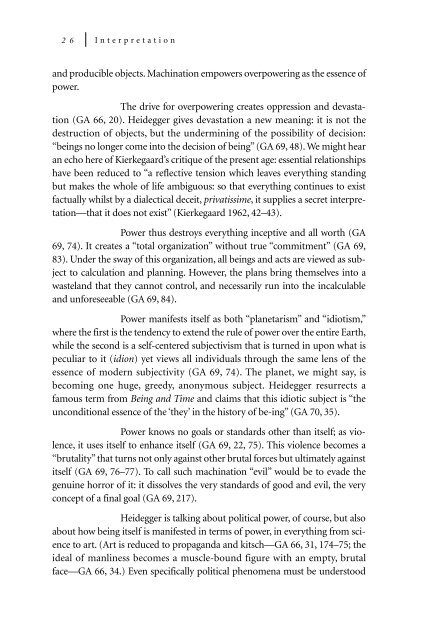Beyond Struggle and Power: Heidegger's Secret ... - Interpretation
Beyond Struggle and Power: Heidegger's Secret ... - Interpretation
Beyond Struggle and Power: Heidegger's Secret ... - Interpretation
Create successful ePaper yourself
Turn your PDF publications into a flip-book with our unique Google optimized e-Paper software.
2 6 <strong>Interpretation</strong><br />
<strong>and</strong> producible objects. Machination empowers overpowering as the essence of<br />
power.<br />
The drive for overpowering creates oppression <strong>and</strong> devastation<br />
(GA 66, 20). Heidegger gives devastation a new meaning: it is not the<br />
destruction of objects, but the undermining of the possibility of decision:<br />
“beings no longer come into the decision of being” (GA 69, 48). We might hear<br />
an echo here of Kierkegaard’s critique of the present age: essential relationships<br />
have been reduced to “a reflective tension which leaves everything st<strong>and</strong>ing<br />
but makes the whole of life ambiguous: so that everything continues to exist<br />
factually whilst by a dialectical deceit, privatissime, it supplies a secret interpretation—that<br />
it does not exist” (Kierkegaard 1962, 42–43).<br />
<strong>Power</strong> thus destroys everything inceptive <strong>and</strong> all worth (GA<br />
69, 74). It creates a “total organization” without true “commitment” (GA 69,<br />
83). Under the sway of this organization, all beings <strong>and</strong> acts are viewed as subject<br />
to calculation <strong>and</strong> planning. However, the plans bring themselves into a<br />
wastel<strong>and</strong> that they cannot control, <strong>and</strong> necessarily run into the incalculable<br />
<strong>and</strong> unforeseeable (GA 69, 84).<br />
<strong>Power</strong> manifests itself as both “planetarism” <strong>and</strong> “idiotism,”<br />
where the first is the tendency to extend the rule of power over the entire Earth,<br />
while the second is a self-centered subjectivism that is turned in upon what is<br />
peculiar to it (idion) yet views all individuals through the same lens of the<br />
essence of modern subjectivity (GA 69, 74). The planet, we might say, is<br />
becoming one huge, greedy, anonymous subject. Heidegger resurrects a<br />
famous term from Being <strong>and</strong> Time <strong>and</strong> claims that this idiotic subject is “the<br />
unconditional essence of the ‘they’ in the history of be-ing” (GA 70, 35).<br />
<strong>Power</strong> knows no goals or st<strong>and</strong>ards other than itself; as violence,<br />
it uses itself to enhance itself (GA 69, 22, 75). This violence becomes a<br />
“brutality” that turns not only against other brutal forces but ultimately against<br />
itself (GA 69, 76–77). To call such machination “evil” would be to evade the<br />
genuine horror of it: it dissolves the very st<strong>and</strong>ards of good <strong>and</strong> evil, the very<br />
concept of a final goal (GA 69, 217).<br />
Heidegger is talking about political power, of course, but also<br />
about how being itself is manifested in terms of power, in everything from science<br />
to art. (Art is reduced to propag<strong>and</strong>a <strong>and</strong> kitsch—GA 66, 31, 174–75; the<br />
ideal of manliness becomes a muscle-bound figure with an empty, brutal<br />
face—GA 66, 34.) Even specifically political phenomena must be understood
















